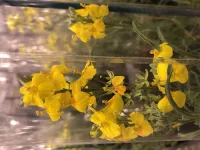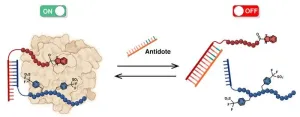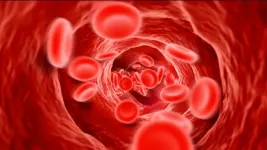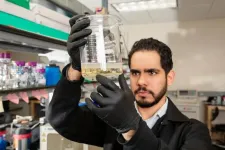(Press-News.org) HOUSTON, SAN DIEGO and LONDON ― The University of Texas MD Anderson Cancer Center and Replay today announced that the Food & Drug Administration (FDA) has issued a ‘safe to proceed’ for the Investigational New Drug (IND) application for PRAME TCR/IL-15 NK (SY-307), an engineered T cell receptor natural killer (TCR NK) cell therapy for relapsed/refractory myeloid malignancies. MD Anderson is the IND sponsor.
PRAME TCR/IL-15 NK (SY-307) is being developed by Syena, an oncology-focused product company launched by Replay and MD Anderson based on the scientific discoveries of Katy Rezvani, M.D., Ph.D., professor of Stem Cell Transplantation & Cellular Therapy at MD Anderson. Syena has an exclusive license to Miltenyi Biotec’s PRAME (PReferentially expressed Antigen in MElanoma) T cell receptor (TCR). The engineered PRAME-targeted TCR NK cell therapy is developed from cord blood-derived NK cells that express a high affinity TCR targeting the PRAME tumor-associated neoantigen.
PRAME is highly immunogenic and expressed on numerous different cancer types, including hematologic malignancies such as acute myeloid leukemia (AML) and myelodysplastic syndromes (MDS), and solid tumors such as melanoma, sarcoma, and ovarian, endometrial, lung and breast cancer. The ability of PRAME to elicit humoral and cellular immune responses, along with its restricted tissue expression, establishes it as a compelling target for cell therapy-mediated cancer immunotherapy.
The Phase I/II open-label study will assess the safety, tolerability and preliminary efficacy of PRAME TCR/IL-15 NK (SY-307) in patients with relapsed/refractory AML and MDS. It will be administered following lymphodepletion with standard doses of fludarabine/cyclophosphamide (Flu/Cy) and decitabine. Up to 44 patients will be enrolled into the study, which is anticipated to commence in Q3 2024.
“PRAME is expressed at high levels in multiple different tumor types, making it a compelling target for engineered TCR NK cancer immunotherapy. The recent IND clearance of our PRAME TCR/IL-15 NK (SY-307) program for AML and MDS represents a significant expansion of Syena’s growing pipeline of “off-the-shelf" engineered TCR NK therapies and complements our existing NY-ESO-1 targeted programs in myeloma and sarcoma,” said Adrian Woolfson, executive chairman, president and co-founder of Replay. “This diversification of Syena’s TCR NK portfolio takes us a step closer to democratizing cell therapy for cancer patients with high unmet medical needs and limited treatment options.”
“The recent FDA IND clearance of our PRAME TCR/IL-15 NK (SY-307) cell therapy is demonstrative of the growing momentum at Syena, as the second program enters the clinic,” said Lachlan MacKinnon, chief executive officer and co-founder of Replay. “This is illustrative of the strength of our business model to rapidly progress the development of a commercial-scale supply of cell therapy products with significant potential for patients.”
“PRAME is a well-known cancer-testis antigen with re-expression in multiple cancer types, including AML and solid tumors, and restricted expression on normal tissues,” said Arun Balakumaran, M.D., Ph.D., chief medical officer at Replay. “This dichotomous expression pattern and its ability to elicit spontaneous humoral and cellular immune responses render it a promising target for cancer immunotherapy.”
“This is an exciting milestone in the development of 'off-the-shelf' engineered TCR NK cell therapies to address significant unmet medical needs,” Rezvani said. “Our hope is the PRAME studies, initially in hematological malignancies and then in solid tumors, will further advance our understanding of the potential for engineered TCR-modified NK cells to benefit patients with relapsed/refractory myeloid malignancies.”
Read this press release in the MD Anderson Newsroom.
- 30 -
Disclosure
MD Anderson has an institutional conflict of interest with Replay and Syena, and MD Anderson has implemented an Institutional Conflict of Interest Management and Monitoring Plan to manage these relationships.
About MD Anderson
The University of Texas MD Anderson Cancer Center in Houston ranks as one of the world's most respected centers focused on cancer patient care, research, education and prevention. The institution’s sole mission is to end cancer for patients and their families around the world, and, in 1971, it became one of the nation’s first National Cancer Institute (NCI)-designated comprehensive cancer centers. MD Anderson is No. 1 for cancer in U.S. News & World Report’s “Best Hospitals” rankings and has been named one of the nation’s top two hospitals for cancer since the rankings began in 1990. MD Anderson receives a cancer center support grant from the NCI of the National Institutes of Health (P30 CA016672).
About Replay
Replay is a genome writing company, which aims to define the future of genomic medicine through reprogramming biology by writing, designing, and delivering big DNA. The Company has assembled a toolkit of platform technologies, including a high payload capacity HSV platform, to address the challenges that currently limit clinical progress and prevent genomic medicine from realizing its full potential.
The Company’s hub-and-spoke business model separates technology development within Replay from therapeutic development in a portfolio of product companies that leverage its technology platforms. Replay’s first-in-class engineered TCR NK cell therapy product company, Syena, uses technology developed by Katy Rezvani, M.D., Ph.D., at The University of Texas MD Anderson Cancer Center in Houston, Texas. Replay’s high payload capacity HSV vector, capable of delivering up to 30 times the payload of AAV, is utilized by Replay’s gene therapy product companies, bringing big DNA treatments to diseases affecting the skin, and eye. Replay is led by a distinguished team of academics, entrepreneurs, and seasoned industry experts.
The Company raised $55 million in seed financing in July 2022 and is supported by an international syndicate of investors including: KKR, OMX Ventures, ARTIS Ventures, and Lansdowne Partners.
Replay is headquartered in San Diego, California. For further information please visit Replay.bio and follow us on LinkedIn and X.
END
MD Anderson and Replay announce FDA clearance of IND application for first-in-class PRAME-targeted TCR NK cell therapy for hematological malignancies
Phase I/II study in patients with relapsed/refractory AML and MDS anticipated to commence Q3 2024
2024-04-30
ELSE PRESS RELEASES FROM THIS DATE:
Discovery of mechanism plants use to change seed oil could impact industrial, food oils
2024-04-30
PULLMAN, Wash. -- Researchers have discovered a new mechanism of oil biosynthesis and found a way to genetically engineer a type of test plant to more efficiently produce different kinds of seed oil that it otherwise wouldn't make.
While the engineering is proof-of-concept, this discovery could lead to improved production of valuable oils used in food and by a range of industries. The study, led by Washington State University researchers, was published in the journal Nature Communications.
“Scientists have been working on producing ...
A new anticoagulant with no risk of bleeding
2024-04-30
Anticoagulant treatments are crucial for managing many conditions, such as heart disease, stroke and venous thrombosis. Current options, however, carry an inherent risk of serious bleeding due to trauma or unforeseen events. A team from the University of Geneva (UNIGE) and the University of Sydney has developed a new anticoagulant, designed to have an on-demand reversible activity, with a fast-acting ‘‘antidote’’. This approach could revolutionise the use of anticoagulants in surgery or other applications. The mechanism of activation and deactivation of the active principle ...
Genetic adaptations have impacted the blood compositions of two populations from Papua New Guinea
2024-04-30
Papua New Guinea (PNG) has a wide range of environments, each presenting unique challenges to human survival. Highlanders and lowlanders of PNG are striking examples of populations facing distinct environmental stress. Whereas the highlanders encounter low oxygen availability due to altitude, the lowlanders are exposed to specific pathogens that are absent in the highlands, such as malaria. Despite these strong environmental pressures, the specific adaptations of these populations have remained overlooked. A new study published in Nature Communications on Tuesday, 30 April 2024 sheds light on the genetic adaptations of Papua New Guineans in response to their unique environmental ...
Abrupt permafrost thaw intensifies warming effects on soil CO2 emission
2024-04-30
According to a recent study published in Nature Geoscience, scientists have found that soil carbon dioxide (CO2) emissions are more sensitive to climate warming in permafrost-collapsed areas than in non-collapsed areas.
This study, based on field warming experiments combined with laboratory incubation of soils from a large-scale sampling, provides new insights about permafrost carbon–climate feedback in the context of future climate warming.
Warmer temperatures have led to rapid permafrost thawing in high-latitude and -altitude permafrost regions. Abrupt permafrost thaw, ...
Scientists discover over 100 new genomic regions linked to blood pressure
2024-04-30
National Institutes of Health researchers and collaborators have discovered over 100 new regions of the human genome, also known as genomic loci, that appear to influence a person’s blood pressure. Results of the study also point to several specific genomic loci that may be relevant to iron metabolism and a type of cellular receptor known as adrenergic receptors.
The study, published in Nature Genetics, is one of the largest such genomic studies of blood pressure to date, including data from over 1 ...
Researchers identify over 2,000 genetic signals linked to blood pressure in study of over one million people
2024-04-30
The Queen Mary-led study reveals the most detailed picture yet of genetic contributors to blood pressure. The findings lead to improved polygenic risk scores, which will better predict blood pressure and risk for hypertension.
Researchers led by Queen Mary University of London and supported by the National Institute for Health and Care Research (NIHR) have discovered over a hundred new regions of the human genome, also known as genomic loci, that appear to influence a person’s blood pressure. In total, over 2,000 independent genetic signals for blood pressure are now reported, demonstrating that blood pressure is a highly complex trait influenced by thousands ...
Scientists find cancer-like features in atherosclerosis, spurring opportunity for new treatment approaches
2024-04-30
Researchers have discovered that the smooth muscle cells that line the arteries of people with atherosclerosis can change into new cell types and develop traits similar to cancer that worsen the disease. Atherosclerosis is characterized by a narrowing of arterial walls and can increase risk of coronary artery disease, stroke, peripheral artery disease, or kidney disorders. The findings, supported by the National Institutes of Health (NIH), could pave the way for the use of anti-cancer drugs to counteract the tumor-like mechanisms ...
A virus could help save billions of gallons of wastewater produced by fracking
2024-04-30
EL PASO, Texas (April 30, 2024) – An estimated 168 billion gallons of wastewater — or produced water — is generated annually by the Permian Basin fracking industry, according to a 2022 report by the Texas Produced Water Consortium. The major waste stream has proved both difficult and costly to treat because of the chemical complexity of the water.
In a new study published in the journal Water, researchers at The University of Texas at El Paso have identified a novel means of treating the wastewater generated by oil and gas production: bacteriophages.
Ramón Antonio Sánchez, a doctoral candidate within UTEP’s chemistry ...
MSD joins the Open Targets consortium
2024-04-30
Open Targets, a public-private partnership dedicated to pre-competitive drug discovery research, today announced MSD, the tradename of Merck & Co., Inc., Rahway, N.J., USA, as the latest partner to join the consortium. Open Targets aims to accelerate the development of safe and effective medicines by leveraging cutting-edge technologies to identify, prioritise, and validate potential drug targets. MSD’s expertise in drug discovery will complement the strengths of the current partners: EMBL’s European Bioinformatics Institute (EMBL-EBI), the Wellcome Sanger Institute, GSK, Sanofi, Pfizer, and Genentech, ...
U of T researchers target neurogenesis in new approach to treat Parkinson’s disease
2024-04-30
Researchers at the University of Toronto have found a way to better control the preclinical generation of key neurons depleted in Parkinson’s disease, pointing toward a new approach for a disease with no cure and few effective treatments.
The researchers used an antibody to selectively activate a receptor in a molecular signaling pathway to develop dopaminergic neurons. These neurons produce dopamine, a neurotransmitter critical to brain health.
Researchers around the world have been working to coax stem cells to differentiate into dopaminergic ...
LAST 30 PRESS RELEASES:
Novel camel antimicrobial peptides show promise against drug-resistant bacteria
Scientists discover why we know when to stop scratching an itch
A hidden reason inner ear cells die – and what it means for preventing hearing loss
Researchers discover how tuberculosis bacteria use a “stealth” mechanism to evade the immune system
New microscopy technique lets scientists see cells in unprecedented detail and color
Sometimes less is more: Scientists rethink how to pack medicine into tiny delivery capsules
Scientists build low-cost microscope to study living cells in zero gravity
The Biophysical Journal names Denis V. Titov the 2025 Paper of the Year-Early Career Investigator awardee
Scientists show how your body senses cold—and why menthol feels cool
Scientists deliver new molecule for getting DNA into cells
Study reveals insights about brain regions linked to OCD, informing potential treatments
Does ocean saltiness influence El Niño?
2026 Young Investigators: ONR celebrates new talent tackling warfighter challenges
Genetics help explain who gets the ‘telltale tingle’ from music, art and literature
Many Americans misunderstand medical aid in dying laws
Researchers publish landmark infectious disease study in ‘Science’
New NSF award supports innovative role-playing game approach to strengthening research security in academia
Kumar named to ACMA Emerging Leaders Program for 2026
AI language models could transform aquatic environmental risk assessment
New isotope tools reveal hidden pathways reshaping the global nitrogen cycle
Study reveals how antibiotic structure controls removal from water using biochar
Why chronic pain lasts longer in women: Immune cells offer clues
Toxic exposure creates epigenetic disease risk over 20 generations
More time spent on social media linked to steroid use intentions among boys and men
New study suggests a “kick it while it’s down” approach to cancer treatment could improve cure rates
Milken Institute, Ann Theodore Foundation launch new grant to support clinical trial for potential sarcoidosis treatment
New strategies boost effectiveness of CAR-NK therapy against cancer
Study: Adolescent cannabis use linked to doubling risk of psychotic and bipolar disorders
Invisible harms: drug-related deaths spike after hurricanes and tropical storms
Adolescent cannabis use and risk of psychotic, bipolar, depressive, and anxiety disorders
[Press-News.org] MD Anderson and Replay announce FDA clearance of IND application for first-in-class PRAME-targeted TCR NK cell therapy for hematological malignanciesPhase I/II study in patients with relapsed/refractory AML and MDS anticipated to commence Q3 2024






